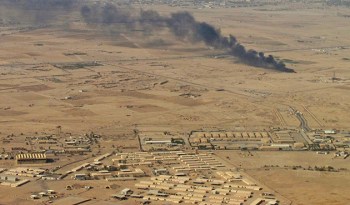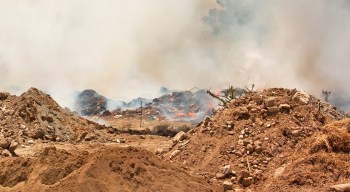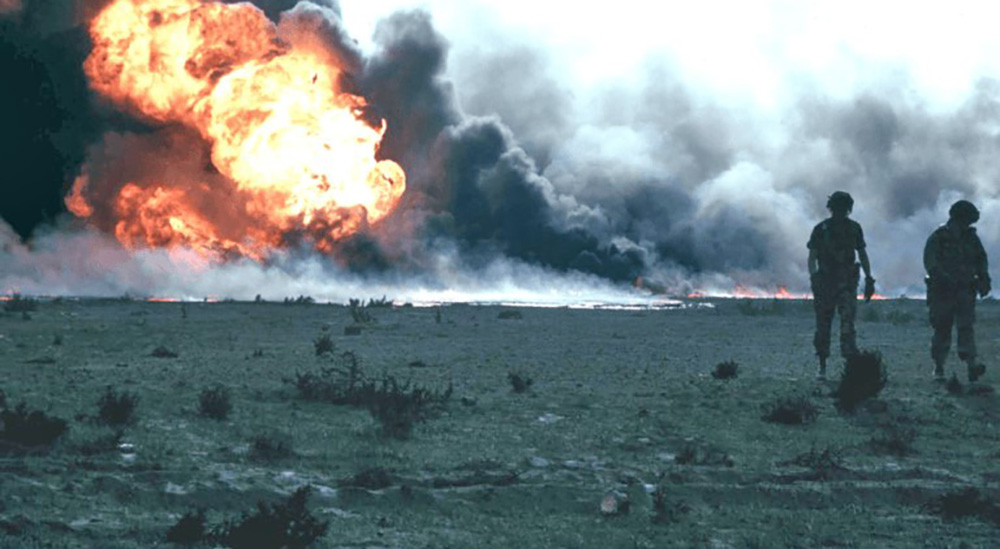The following story is an example of the treatment a Veteran may receive for health concerns related to toxic exposure from airborne hazards and burn pits.
After experiencing a worsening of shortness of breath over the past 15 years, a 37-year-old Veteran visited her primary care doctor to try to find answers and relief. She told her doctor she becomes short of breath with any level of exertion and that she has chronic nasal congestion and difficulty sleeping. Even though she was once quite active, she has not been physically able to exercise—even at low intensity—for at least five years.
She reported moderate improvement with the use of an inhaler but her symptoms always came back. Despite these persistent symptoms, the results of all tests and evaluations came back normal.

Registry established after service members and Veterans experience adverse health effects from deployment-related exposures
She deployed to northern Iraq in the early 2000s. During the deployment she was exposed to a fire in a sulfur mine as well as dust storms and burn pits.
Knowing her symptoms could be related to her exposure, she added her information to the Airborne Hazards and Open Burn Pit Registry online.
After adding her information to the Registry, she received a letter in the mail from the VA Post-Deployment Cardiopulmonary Evaluation Network (PDCEN) inviting her to participate in a specialty evaluation. She asked her doctor if she should consider moving forward with it.
Although her doctor was not familiar with the PDCEN, they wanted to find out more about how best to care for her and recommended participating in the evaluation.
Relationship between Registry and Evaluation Network
The Airborne Hazards and Open Burn Pit Registry was established in 2014 in response to mounting concerns that service members and Veterans were experiencing adverse health effects that might be attributable to deployment-related exposures. The Registry consists of an online questionnaire to document deployment and medical history, exposure concerns and symptoms.
After signing up for the Registry, Veterans can request an in-person or virtual clinical health evaluation at their local VA medical center or military treatment facility.
The optional Registry evaluation explores deployment history, symptoms, medical history, health concerns, residential history, civilian occupational history, civilian environmental exposures and health care utilization. Although these evaluations can help address some concerns, numerous Veterans may have unexplained respiratory symptoms that warrant further investigation. This is where the PDCEN comes in.
In May 2019, VA established the Airborne Hazards and Burn Pits Center of Excellence. One of the center’s objectives is to deliver specialized care and consultation for Veterans with concerns about their post-deployment health, including—but not limited to—unexplained shortness of breath.
Post-Deployment Cardiopulmonary Evaluation Network (PDCEN)
To meet this objective, PDCEN was established. PDCEN is a national network that consists of VA physician scientists at six VA medical centers across the country who conduct specialized research and clinical evaluations for Veterans with concerns about their post-deployment health. Staff at PDCEN screen the Registry to identify Veterans with complex cases of unexplained shortness of breath or difficulty breathing. They invite them to participate in a specialty evaluation at the site that is most convenient to their location.
After completing a detailed questionnaire as the first step of the PDCEN evaluation, Veterans undergo a series of comprehensive tests. The results are closely evaluated by physician scientist experts and then provided to the Veteran at a final summary review visit.
The primary objectives of this final review are to:
- Inform the Veteran of what respiratory and related conditions they have
- Determine whether the conditions are deployment-related
- Inform the Veteran of what treatments or follow-up care are recommended
PDCEN then provides these care recommendations to the Veteran’s primary care physician to improve the ongoing management of the Veteran’s conditions.

Collected data to create standard practices for medical evaluations of Veterans exposed to respiratory hazards during deployment
While the Registry and related examinations address the needs of many Veterans, others may require the more in-depth and comprehensive evaluation provided by PDCEN. These clinical evaluations are the first objective of PDCEN. The second objective is to learn from these evaluations by analyzing the collected data.
These collected data are shared with the Airborne Hazards and Burn Pits Center of Excellence and across PDCEN to include in studies on deployment-related respiratory disease and to learn more about how to diagnose and treat deployment-related conditions. PDCEN hopes not only to improve the health of individual Veterans but to also create standard practices for both VA and non-VA medical evaluations of Veterans exposed to respiratory hazards during deployment.
From evaluation to treatment
The Veteran decided to move forward with the invitation to participate in the PDCEN evaluation. Her evaluation uncovered nonallergic rhinitis and symptoms consistent with small airways disease. Both were reported as most likely related to her significant environmental exposures during deployment.
After reviewing the findings from the PDCEN evaluation, her primary care physician started her on a treatment plan to address her diagnoses. After several weeks of this treatment combined with pulmonary rehabilitation, she reported an improvement in sleep and nasal symptoms but continued to experience some difficulty when exercising.
This case, described in greater detail in an article published by PDCEN researchers, shows the significant limitations that a previously healthy and active Veteran may experience following exposures to airborne hazards during deployment. But through her participation in the Airborne Hazards and Burn Pits Center of Excellence and subsequent PDCEN evaluation, she received two important diagnoses that were instrumental in helping her provider prescribe appropriate treatment.
Data from her evaluation and others will help the Airborne Hazards and Burn Pits Center of Excellence and PDCEN establish best practices for evaluation and treatment of deployment-related respiratory concerns for Veterans across the country.
Topics in this story
Link Disclaimer
This page includes links to other websites outside our control and jurisdiction. VA is not responsible for the privacy practices or the content of non-VA Web sites. We encourage you to review the privacy policy or terms and conditions of those sites to fully understand what information is collected and how it is used.
More Stories
Black Lab Raisin reminds Veterans of life outside the hospital, brightens their lives with her endless capacity for joy.
VA remains open for business and is closely monitoring the Change Healthcare (CHC) cybersecurity incident.
Take the stress out of travel. My HealtheVet makes preparing for your time away easy with these five quick tips.







Why is the PACT act not for all veterans and all bases were toxic chemicals were uesed????
I was station at NAS Ellyson field, Pensacola and was exposed to toxic chemicals for over 3 years before the EPA step in!
the DOD has spent over 4 million cleaning up the toxic mess so far!
I have bad lungs from the exposure BUT the VBA will not service connected it!!! NOT ON the list!!!!
Where can a Vietnam era vet find out info on how to get treatment for dependents affected from my exposure to agent orange while serving a year in Thailand in 1973-1974. I married a Thai national, and we were expecting upon departure for the US . I was told that as long as I have a 100% disability / service connected that my dependents would be qualified under PACT to medical treatments for their conditions being my dependents?
If you — the veteran — is unjustly wronged by the government, contact your elected officials (congressman, congresswoman, or senator) and ask for assistance. It is like having a Big Brother on the playground.
Expose to muster gas at Dessert Storm
From Vietnam (Agent Orange); too Desert Storm (depleted ammo, burning human waste, burning oil fields) too Bosnia living in an abandoned cold plant; breathing, eating, urinating, and spitting all that old cold dust! Still VA states that I have no medical issues.
I was exposed to the predecessor of Agent Orange by the name of Napalm in the Navy back in the early 60’s. We were assigned as Aviation Ordnanceman mixing this chemical with Aviation fuel (JP5) in big tanks and filled empty pods that were hung under wings of A4D and F4 aircraft. This was aboard the USS Forrestal CVA59/CV59/AVT59. Also during my tour of three med cruises I was in charge of one ordnance magazine that had canisters (metal 8 ft long by 18in wide round that had windows that had to be checked for color changes every other day. It required a Top Secret clearance at the time., and I had to undress my self down to my scree’s before I entered the hatch door.Never found out what was in the pods, but would guess they contained chemicals to do harm to others. Maybe even me as I age out of this planet . I even got the pleasure of chasing prisoners from the brig down in the holes/bilges to chip/paint/clean the asbestos the prisoners chipped away.I didn’t or ever smoke cigarettes but had a couple of scares with required tomograms that showed spots in both lungs.The VA doesn’t want talk about either subject, they claim its all in you head……………
good luck getting a dr appointment through the va in less then 2 months with a dr that wont listen to you and only wants to check the box for your yearly physical.. and why not do extensive labs instead of asking some questions to cya
WE HAD BURN BARRELS AT OUR BASE FOR A LOT OF CHEMICALS INCLUDING TOLULENE. RUSHMORE AF STATION IN SO DAK WAS CLOSED ON ACCOUNT OF CHEMICALS AND NOTHING HAS BEEM SAID ABOUT IT. WHY
i wonder what chance i have at my c&p exam as a former “BT” (boiler tech) in the navy with asbestoes exposure, for my V.A. diagnosed breathing problems as ; c.o.p.d. , c.o.l.d. and emphazema, when i inlisted back in 1974 i didnt smoke , but learned quickly and did my work in the “hole” being a “snipe” working with asbestoes wrapped pipes , boilers and anything in the heat or steam systems. along with the buildings i stayed at in san diego while i was at “shore support group” most of those buildings have been demolished which also had asbestoes in them. and another supposed “exposure” we had; Mustard gas?? at great lakes. i took boot camp there , and BT A school, for” boiler tender”. who knows what else was there.
Health care yes, but don’t count on compensation. The VA, does not give you the compensation even through you take medicine for a condition
they put on the presumptive list.
Ronald: What is your presumptive condition? The VA’s system can be confusing, but if you have a condition that was caused by, originated in, or was made worse by your service, a proper claim should result in a proper award. From my perspective, the VA is guilty of poor advertising and being a huge bureaucracy; the first is not an issue for you at this point, and there is help available for the second.
When is something going to be done for Agent Orange for veterans who served in Vietnam. My husband had prostate cancer, with no one in his family having had that same problem. But, was told by the VA that nothing has been decided on Agent Orange coverage. Must be like the water issue in North Carolina that it has only taken YEARS for the VA to decide that it is a real issue!
Prostate Cancer has long been recognized by the VA/US Government as having been caused by Agent Orange-as long as the Vet had boots on the ground in Vietnam. If your husband has Prostate Cancer, and service in Vietnam-all he needs to do is file for service connection for it. He will automatically be granted service connection for it.
Please get an agent orange attorney
TOOK’M LONG ENUF !!!
Why is contact info so hard to put into an artical ?
I was stationed at Camp Lejeune for a period of three years. Now I suffer from Interstitual lung disease, diabetes, congestive heart failure, and a host of other illnesses. Should I be evaluated for these toxic substances related problems or not.
Thank you for an excellent article. I’m sitting here wheezing & wiping my leaky faucet nose for the 100th time & it is like OH! YEAH! Something I needed to be made aware of. Again, Thank you!
I was station at fort dix nj , on guard duty within the ammo / chemicals dumps many times. After guard duty my eyes would get red very itchy and very hard to breathe for several days. I. was told that it would go way . I have very severe pulmonary and respiratory . I’m now being treated at the VA
As a Heavy Artillery Officer I, as well as others worked with “special weapons” and became what was called “A Prefix 5” both in Korea as well as Fort Bliss andFort Sill
we assembled and disasembled the special weapons that were M422 and M425 (I am not extremely sure about the numbers) we wore the same badges that X Ray
operators use in the hospital that was part of my job from 1964 to 1967. I ask are those of us who were assigned this duties will ever be considered as possible cause
for disabilitiy.
I was medivac’d out of Vietnam due to a skin condition causing Hives and regular out breaks, but never from the Chloroquine. I was misdiagnosed (intentionally???) and all my medical records intentionally withheld until 2015, when some were released, but six (6) months immediately after my return are still intentionally withheld, and the VA did this to deprive me and my dependents from getting one cent in compensation. Now, my son is dead because of this and my exposure to and ingesting, eating, drinking, bathing, inhaling and living in AGENT ORANGE, “Boots on Ground” in Vietnam. The Army and The Department of Veterans Affairs intentionally withheld my medical records ’s despite dozens of F.O.I.A’s, SF 180’s and hand written requests, to deprive me of a Medical Discharge and benefits for myself and children.